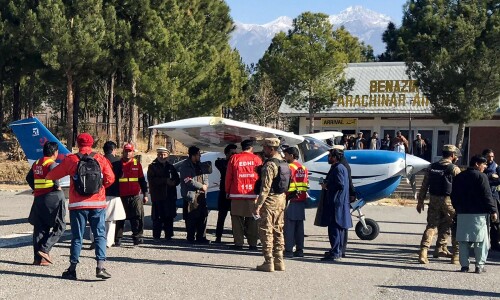HORSE-racing in Lahore has been hit hard by steep price-hike during the racing calendar stretching from July 1, 2007, to June 30, 2008.
Due to increasing prices, horse-owners and trainers are under economic constraints feeling the pinch of ever-increasing cost of maintenance, feeding and veterinary services of their stables.
The stake-money offered by the Lahore Race Club (LRC) to horses placed first, second and third is quite meagre.
This is an open secret that all horses are not of the same class, pedigree and standard, some are mediocre, some are good and very few are of a high calibre.
Some may win one or more races during the season and there may be many who fail to win even once but the maintenance cost, feeding and other expenditures incurred on horses are huge.
So majority of the horses, if they cannot win a race or races become a burden on their owners particularly those, who make their earning through the horses.
In spite of the qualitative improvement and provision of most modern racing facility for an all weather equine sporting activity, the price-hike looks to have been taking its toll forcing owners to curtail their stable strength or make a silent exit from the Racecourse.
There are at present around five hundred horses at the Lahore Racecourse. Nearly one hundred and fifty are non-pedigreed animals, who have been inducted into racing after the LRC allowed them because of lack of entries of the thoroughbreds.
The need for such a big action was felt because horse-breeding industry was surrounded by such a state of affairs, with breeders desperately on the look out for buyers to dispose of their charges.
The fall in the demand of the new thoroughbred bloodstock and the owners disinterest to buy thoroughbreds resulted in the promotion of non-pedigree animals, whose price range, maintenance cost etc are far less as compared to thoroughbreds.
Furthermore, non-pedigree animals run like machines, even six or more times during a month whereas the running period duration of thoroughbreds is very limited.
During the March 2008 auction sale, a limited choice of thoroughbreds was offered to intending buyers of pedigreed bloodstock. The number of catalogued colts and fillies was down significantly as compared to earlier years. This clearly reflected market’s stifling condition.
However, owners and trainers, who professionally involved in racing have found a good alternative in the form of non-pedigree animals to carry on their business activity.
All is not bad and there is a bright side of the picture as well as three-year-old and four-year-old thoroughbred colts and fillies have established themselves as vintage crop by their performances during the season under review.
In the 35 winter meetings followed by nine summer meetings, the colts and fillies, in their respective age groups put up really spectacular performances to earn great applause from the equine sports connoisseurs.
They have not pleased race-goers by their feats winning three or more races in-a-row or at random showing wonderful strides and bringing laurels to the owners and sires fame.
The highly bred filly, Brave Act, was the most outstanding performer of the season among the Pakistani thoroughbreds. Owned by Sohrab Khan, the daughter of Replay out-of English mare, Coxswain, had won the Pakistan Derby 2008 in a fantastic performance. She had achieved a rare feat to her credit winning Breeders Cup, Pakistan Derby Trials and the Pakistan Derby, a feat so far unachieved by any filly or colt yet. She not only won acclaim on the course but also earned the honours of being the highest-stake-winner of the season.
Brave Act’s breeder, Abdul Qadir Mamdot, had told Dawn that he had made efforts to send the filly to India to take part in races there but the quarantine and other rules, regarding affiliation of Jockey Club Of Pakistan with the Japan based Asian Racing Authority, came in the way.
Some of the English thoroughbreds carried the limelight during the season winning cup and events named after the royalties or those sponsoring the equine sports.
A few sad events marred racing called the sports of kings, when horses installed were pulled by their owners just to please bookmakers.
Towards the end of the season, the racing circles were stricken with the sad news of the demise of a former LRC chairman, Syed Wajid Ali Shah, who had made sterling contribution in the realm of horse- racing breeding and sports. In his death Pakistan lost the most renowned and internationally recognized sports administrator, the country had ever produced.











































Dear visitor, the comments section is undergoing an overhaul and will return soon.